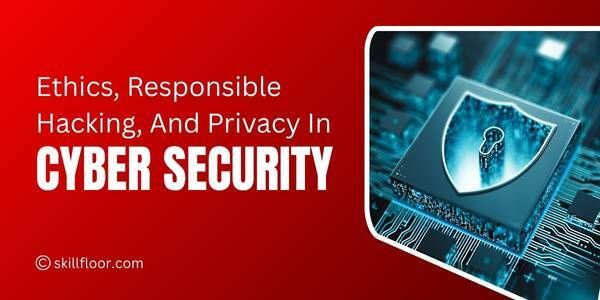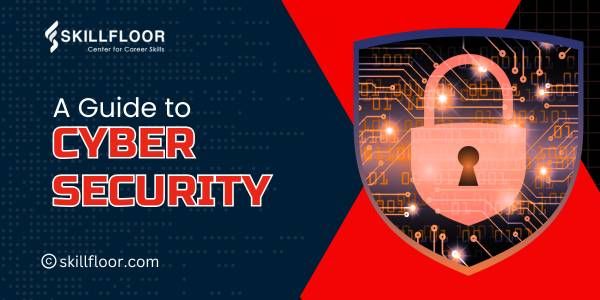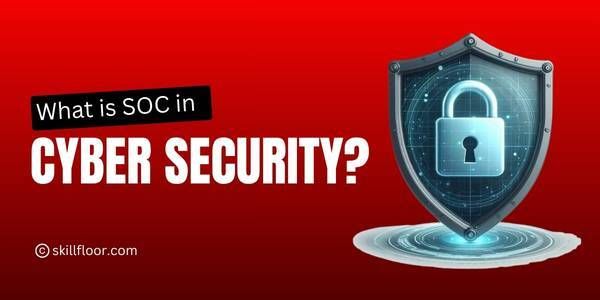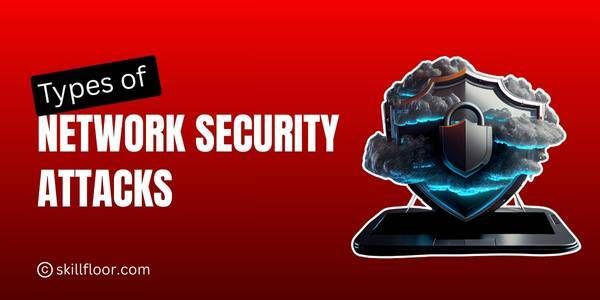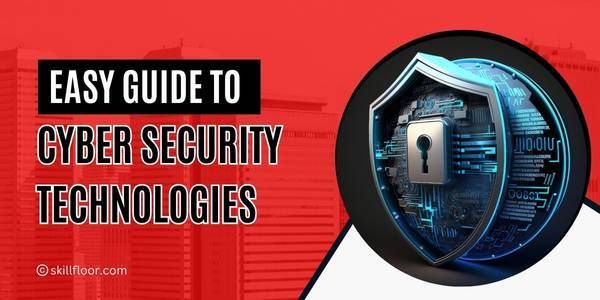TABLE OF CONTENTS:
- How to learn cyber security
- How Cyber security works
-
Scope of cyber security
-
Skills for cyber security
-
Cyber security framework
-
Cyber security tools list
-
Cyber security course eligibility
-
Cyber security course syllabus
-
Ethical hacking and cyber security
-
Cyber security future
Cyber security is an ever-growing concern in today's digital landscape. With the increasing reliance on technology and the interconnectedness of systems, protecting sensitive information and preventing cyber threats has become a critical priority. Cyber security refers to the practices, measures, and technologies designed to safeguard digital systems, networks, and data from unauthorized access, disruption, and misuse.
The field of cyber security encompasses a wide range of disciplines, including network security, data protection, threat detection and response, vulnerability management, and incident handling. It involves identifying potential risks and vulnerabilities, implementing protective measures, and staying vigilant against evolving threats.
Cyber security is crucial for individuals, businesses, and governments alike. It helps protect personal information, financial transactions, intellectual property, and sensitive data from cybercriminals, hackers, and malicious entities. By implementing effective cyber security measures, organizations can minimize the risk of data breaches, financial losses, reputational damage, and legal implications.
As technology advances, so do the tactics employed by cybercriminals. Cyber security professionals play a vital role in defending against these threats, constantly adapting and evolving their strategies to stay one step ahead. They possess in-depth knowledge of emerging threats, security protocols, encryption algorithms, and security frameworks to develop robust defense mechanisms.
In a world where cyber attacks are becoming more sophisticated and prevalent, understanding the fundamentals of cyber security is crucial. It enables individuals and organizations to proactively identify vulnerabilities, implement preventive measures, and respond effectively to incidents. By prioritizing cyber security, we can foster a safer digital environment, protect critical infrastructure, and safeguard the confidentiality, integrity, and availability of information in an increasingly interconnected world.
1. How to learn Cyber Security?
To Learn Cyber Security, follow these steps:
-
Gain foundational knowledge: Start by understanding the basics of computer networks, operating systems, and programming languages. Familiarize yourself with key concepts such as encryption, authentication, and security protocols.
-
Pursue formal education or certifications: Consider enrolling in a cyber security degree program or obtaining industry-recognized certifications like CompTIA Security+, Certified Ethical Hacker (CEH), or Certified Information Systems Security Professional (CISSP). These provide structured learning and validate your skills.
-
Join online courses and tutorials: Take advantage of online platforms that offer cyber security courses and tutorials. Websites like Coursera, edX, and Udemy provide a wide range of options, including both free and paid courses, covering various topics in cyber security.
-
Engage in hands-on practice: Gain practical experience by participating in cyber security challenges, Capture The Flag (CTF) competitions, or simulated exercises. These platforms allow you to apply your knowledge and skills in real-world scenarios and enhance your problem-solving abilities.
-
Stay updated with industry news and trends: Cyber security is a rapidly evolving field. Stay current with the latest threats, vulnerabilities, and security technologies by following reputable blogs, subscribing to industry newsletters, and attending webinars or conferences.
-
Join cyber security communities: Engage with like-minded individuals in online forums, social media groups, or local meetups. Networking with professionals in the field can provide valuable insights, mentorship opportunities, and access to resources.
-
Practice ethical hacking: Understand the mindset of attackers by exploring ethical hacking techniques. This involves learning about penetration testing, vulnerability scanning, and ethical hacking methodologies. However, always ensure you adhere to legal and ethical boundaries.
-
Continuous learning and professional development: Cyber security is an ongoing journey. Stay curious and continue to expand your knowledge and skills through self-study, research, and continuous professional development. Stay abreast of emerging technologies and trends to stay ahead in this ever-evolving field.
2. How Cyber Security Works?
Cyber security works by employing a range of strategies, technologies, and practices to protect digital systems, networks, and data from unauthorized access, attacks, and vulnerabilities. It involves a multi-layered approach that combines preventive, detective, and responsive measures to ensure the confidentiality, integrity, and availability of information
Preventive measures form the first line of defense in cyber security. These include implementing strong access controls, robust authentication mechanisms, and encryption protocols to protect data in transit and at rest. Firewalls, intrusion detection and prevention systems, and antivirus software are also used to safeguard networks and systems from malicious activities.
Detective measures involve monitoring and analyzing network traffic, system logs, and user behavior to identify potential security incidents or breaches. Intrusion detection systems, security information and event management (SIEM) tools, and log analysis techniques help in detecting and responding to suspicious activities, anomalies, or indicators of compromise.
Responsive measures are taken once a security incident or breach is detected. Incident response teams are responsible for investigating, containing, and mitigating the impact of the incident. They follow predefined protocols and procedures to minimize damage, restore services, and recover affected systems.
Cyber security also involves regular vulnerability assessments and penetration testing to identify weaknesses in systems and networks. By conducting these tests, organizations can proactively address vulnerabilities and apply necessary patches or updates.
Employee training and awareness programs play a critical role in cyber security. Educating users about safe online practices, phishing attacks, and social engineering techniques helps in reducing the human factor as a vulnerability.
Cyber security involves staying updated with the latest security threats, vulnerabilities, and emerging technologies. Security professionals continuously monitor threat intelligence sources, participate in information sharing communities, and collaborate with industry peers to stay ahead of cyber threats.
3. Scope of Cyber Security
The scope of cybersecurity is rapidly expanding in response to the evolving digital landscape and the increasing frequency and sophistication of cyber threats. Cybersecurity encompasses a broad range of practices, technologies, and strategies aimed at protecting computer systems, networks, and data from unauthorized access, malicious attacks, and data breaches. With the growing reliance on technology and the proliferation of interconnected devices, the scope of cybersecurity extends to areas such as cloud computing, mobile devices, the Internet of Things (IoT), and critical infrastructure protection.
The demand for cybersecurity professionals is on the rise as organizations recognize the importance of safeguarding their digital assets and maintaining the privacy and trust of their customers. Careers in cybersecurity encompass various roles, including security analysts, ethical hackers, incident responders, vulnerability assessors, and security architects.
The scope of cybersecurity also extends beyond the corporate realm, with governments and regulatory bodies implementing stringent cybersecurity policies and frameworks to protect national security and public infrastructure. Additionally, cybersecurity plays a vital role in safeguarding personal data, addressing privacy concerns, and ensuring compliance with data protection regulations.
As technology continues to advance, the scope of cybersecurity will further expand to address emerging threats such as artificial intelligence-based attacks, ransomware, and social engineering techniques. Furthermore, the integration of cybersecurity with other domains like artificial intelligence and data analytics presents new opportunities and challenges for professionals in the field.
4. Skills for Cyber Security
-
Technical Proficiency: Understanding computer networks, operating systems, and programming languages, as well as knowledge of encryption, firewalls, intrusion detection systems, and other security tools.
-
Network Security: Ability to design, implement, and manage secure network architectures, including secure configurations, access controls, and network segmentation.
-
Threat Intelligence: Knowledge of current cyber threats, attack vectors, and malware trends to proactively identify potential risks and develop effective defense strategies.
-
Vulnerability Assessment: Ability to conduct vulnerability assessments, penetration testing, and risk assessments to identify and address potential weaknesses in systems and networks.
-
Security Operations: Proficiency in security monitoring, log analysis, and incident management using tools like SIEM (Security Information and Event Management) and Security Operations Center (SOC) processes.
-
Ethical Hacking: Understanding of ethical hacking techniques, penetration testing methodologies, and tools to assess and improve the security posture of systems and networks.
These skills are foundational for a successful career in cyber security, and individuals with a combination of technical expertise, analytical thinking, and a proactive mindset are highly sought after in the field.
5. Cyber Security Framework
A cybersecurity framework provides a structured approach to managing and mitigating cybersecurity risks within an organization. It serves as a blueprint for establishing and maintaining effective cybersecurity practices, policies, and controls. A comprehensive framework typically encompasses the following key components:
-
Risk Assessment
-
Security Controls
-
Incident Response
-
Continuous Monitoring
-
Compliance and Governance
-
Training and Awareness
By adopting a cybersecurity framework, organizations can establish a systematic and proactive approach to managing cybersecurity risks, protecting critical assets, and mitigating potential damage from cyber threats. Frameworks such as the National Institute of Standards and Technology (NIST) Cybersecurity Framework and ISO/IEC 27001 provide internationally recognized guidelines and standards that organizations can customize and implement based on their specific needs and risk profiles.
6. Cyber Security Tools List
Cyber security tools encompass a wide range of technologies and software that help protect digital systems and networks. Some essential tools include firewalls, which monitor and control network traffic; antivirus software, which detects and removes malware; intrusion detection and prevention systems, which monitor for and respond to suspicious activities; vulnerability scanners, which identify weaknesses in systems; encryption tools, which secure data by converting it into unreadable format; security information and event management (SIEM) solutions, which collect and analyze security event logs; and penetration testing tools, which simulate attacks to identify system vulnerabilities. Additionally, password managers, multi-factor authentication tools, and secure file transfer protocols are also crucial for enhancing security. These tools work in conjunction to fortify defenses and mitigate cyber threats.
7. Cyber Security Course Eligibility
Eligibility for a cybersecurity course typically requires a basic understanding of computer systems, networking concepts, and information technology. Additionally, some courses may have specific prerequisites, such as prior knowledge of programming languages, operating systems, or database systems. Depending on the level of the course (e.g., undergraduate or graduate), there may be additional requirements or recommended qualifications. It is advisable to check the specific eligibility criteria outlined by the institution offering the cybersecurity course to ensure that you meet the necessary prerequisites.
8. Cyber Security Course Syllabus
A typical cyber security course syllabus covers a range of topics to provide a comprehensive understanding of the field. It includes areas such as network security, cryptography, ethical hacking, incident response, risk management, vulnerability assessment, and security policies and procedures. The syllabus may also incorporate practical hands-on exercises, case studies, and real-world simulations to reinforce learning.
It emphasizes the importance of legal and ethical considerations in the context of cyber security. Overall, the syllabus aims to equip students with the necessary knowledge and skills to protect digital systems, detect and respond to cyber threats, and establish robust security practices in organizations.
9. Ethical Hacking and Cyber Security
Ethical hacking and cyber security are closely intertwined disciplines that focus on protecting digital systems and networks from unauthorized access, vulnerabilities, and cyber threats. Ethical hacking, also known as penetration testing, involves authorized individuals employing hacking techniques to identify and address security weaknesses in systems, networks, and applications. It plays a crucial role in proactively identifying vulnerabilities before malicious hackers exploit them. Cyber security, on the other hand, encompasses a broader scope, encompassing preventive, detective, and responsive measures to safeguard digital assets.
It includes implementing security protocols, monitoring network traffic, conducting risk assessments, and responding to security incidents. Ethical hacking is an integral part of cyber security as it helps organizations assess their security posture, strengthen defenses, and mitigate potential risks. Together, ethical hacking and cyber security form a comprehensive approach to maintaining the integrity, confidentiality, and availability of digital systems in an increasingly connected world.
10. Cyber Security Future
The future of cyber security holds both opportunities and challenges as technology continues to advance. With the growing interconnectedness of devices, the Internet of Things (IoT), and the increasing adoption of artificial intelligence and machine learning, the attack surface for cyber threats expands. As a result, the demand for skilled cyber security professionals will continue to rise.
One significant trend in the future of cyber security is the integration of automation and AI-driven technologies. These advancements can help detect and respond to threats in real-time, augmenting human capabilities and improving the efficiency of security operations. However, they also pose new challenges, as cybercriminals may leverage AI for sophisticated attacks.
Another area of focus is the protection of critical infrastructure, such as power grids, transportation systems, and healthcare networks. As these systems become more digitally connected, ensuring their resilience against cyber attacks becomes paramount. Governments and organizations will need to invest in robust defenses and collaborate on global cyber security frameworks to safeguard critical infrastructure.
The future also brings the need for proactive and predictive security measures. Threat intelligence, machine learning algorithms, and behavior analytics will play a vital role in identifying emerging threats and predicting future attack vectors. This proactive approach can help organizations stay one step ahead of cybercriminals.
Privacy and data protection will continue to be key concerns. Stricter regulations, such as the General Data Protection Regulation (GDPR) and California Consumer Privacy Act (CCPA), highlight the importance of protecting personal data. Organizations will need to prioritize data privacy and implement secure data handling practices to maintain customer trust.
As cyber threats evolve, so will the field of cyber security. Continuous education and upskilling will be essential for professionals to stay abreast of the latest threats, technologies, and mitigation strategies. Collaboration between governments, organizations, and academia will be crucial in addressing global cyber security challenges.
Considering all the facts, Cybersecurity is an essential and rapidly evolving field in today's digital landscape. It encompasses practices, technologies, and strategies aimed at protecting computer systems, networks, and data from unauthorized access and malicious attacks. The scope of cybersecurity extends to areas such as cloud computing, mobile devices, the Internet of Things (IoT), and critical infrastructure protection. With the increasing reliance on technology and the ever-growing threat landscape, the demand for cybersecurity professionals is on the rise. A comprehensive cybersecurity framework provides a structured approach to managing and mitigating risks, incorporating risk assessment, security controls, incident response, continuous monitoring, compliance, and training.
By adopting cybersecurity best practices and frameworks, organizations can establish a proactive and effective approach to safeguarding their digital assets, maintaining trust, and mitigating potential damage from cyber threats. Continuous innovation, collaboration, and vigilance are necessary to stay ahead of emerging threats and ensure the ongoing security and resilience of digital systems and data.
Related Posts
Cyber Security Jobs for Freshers: Complete Guide 2026
Kickstart your career in cybersecurity! Discover top jobs, skills, and certifica...
The Complete Guide to Becoming a Cyber Security Consultant
Unlock your new future as a cyber security consultant! Learn skills, certificati...
Zero Trust Security Model: What It Means and Why It Mat...
Discover the Zero Trust Security Model, why traditional security fails, and how ...
Cybersecurity Career Mistakes to Avoid Early On
Kickstart your cybersecurity career by learning the biggest early mistakes to av...
Ethics in Cyber Security: Responsible Hacking & Privacy
Explore cybersecurity ethics, responsible hacking, and privacy protection. Learn...
What Is Spoofing in Cyber Security?
Grasp spoofing in cyber security, a rising threat costing organizations millions...
Cyber Security Engineer Salary in India
Curious about a Cyber Security Engineer salary in India? Explore current pay tre...
What is SOC in Cyber Security?
Discover how a SOC in Cyber Security protects businesses 24/7, detects cyber thr...
Network Security Tools and Techniques Everyone Can Learn
Discover essential tools and techniques for network security that anyone can lea...
Information Security Models: A Simple Guide
Explore information security models in an easy way. Protect your data, prevent c...
Common Types of Network Security Attacks
Discover the common types of network security attacks, how they can impact your ...
Network Security Engineer Roles and Responsibilities Guide
Explore the roles, responsibilities, skills, career paths, and salary of network...
Complete Overview of Cyber Security Job Roles
Discover cyber security job roles, including duties, required skills, salary ran...
How to Start a Career in Cyber Security
Start your career in cybersecurity today. Learn key skills, earn certifications,...
Simple Guide to Cyber Security Technologies
Learn to use Cyber Security Technologies effectively to stay safe online, protec...
Understanding Network Security Models
Explore various network security models and how they protect your data and syste...
Salary of a Network Security Engineer in India
Explore the average salary of a Network Security Engineer in India. Learn how ex...
Ethical Hacking Fresher Salary Trends in Bhubaneswar
Explore ethical hacking fresher salary trends in Bhubaneswar. Learn about pay sc...
Learn to Build a Career in Cybersecurity from Bhubaneswar
Begin your cybersecurity journey in Bhubaneswar with industry insights, learning...
Ethical Hacking Salaries and Job Roles in Bhubaneswar
Explore ethical hacking salaries and job roles in Bhubaneswar, including career ...






























